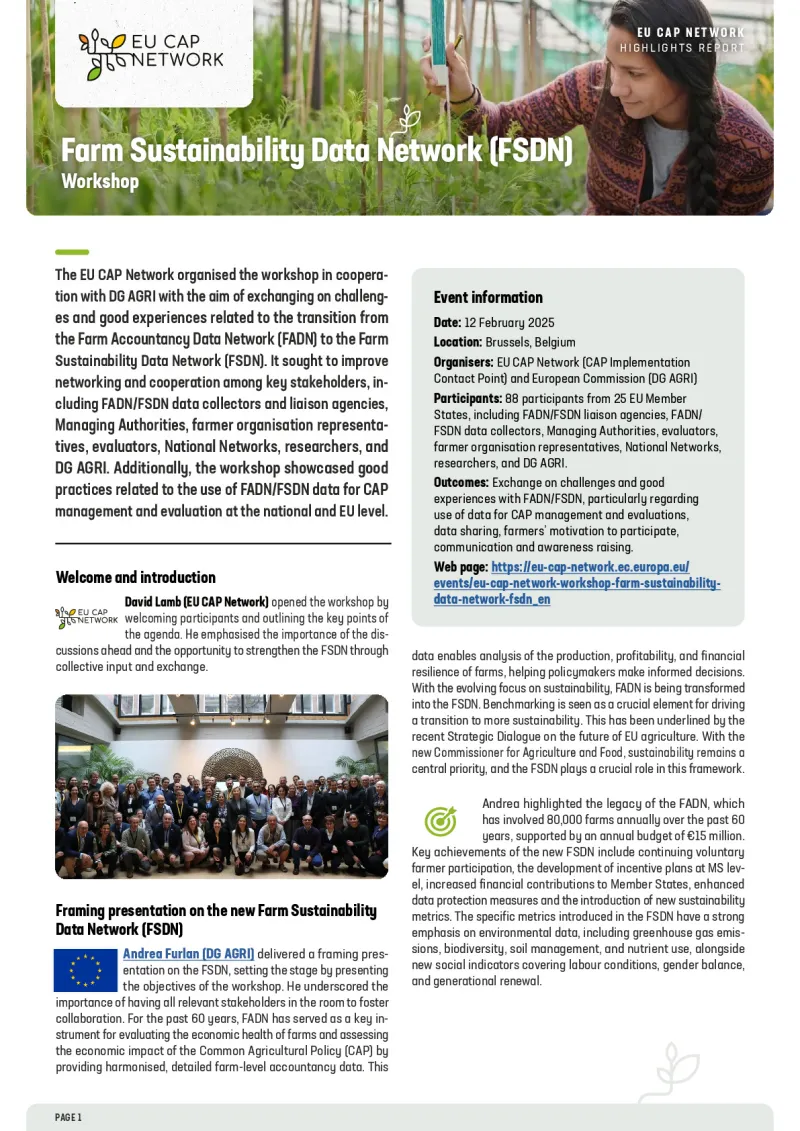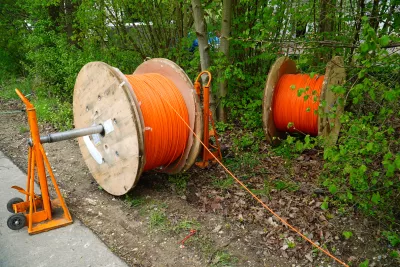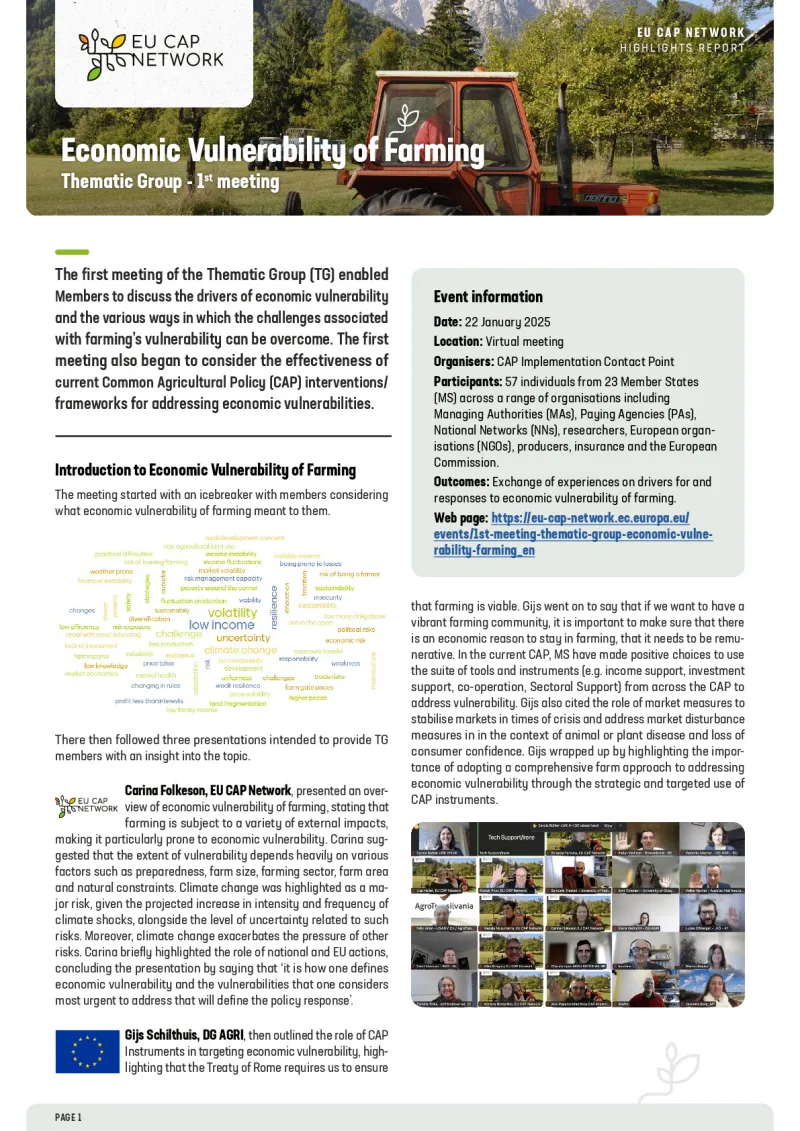Making the Farm Sustainability Data Network an EU success story
Equipping farmers with detailed insights into their production practices, the Farm Sustainability Data Network (FSDN) has immense potential to improve the understanding and implementation of the CAP.

Page contents

When EU farmers are equipped with detailed data insights into their production practices, they are better positioned to make informed business decisions about resource allocations and environmental stewardship. The Farm Sustainability Data Network (FSDN) has immense potential to improve and simplify understanding of the full effects of EU agricultural policy. The FSDN is complemented by a new evidence-based farm-level benchmarking tool from the European Commission that builds stakeholder capacity for a better understanding of farming practices, funded by the Common Agricultural Policy (CAP).
FSDN aligns with (and contributes to) policy priorities enshrined in the Competitiveness Compass and Vision for Agriculture and Food. These reflect the latest EU intelligence and rely on data-led decision-making to help steer effective EU actions that have a factual basis. Quantifiable evidence of agri-food competitiveness is essential for transparent and accountable governance of farming systems. Common data systems are also encouraged as a shared medium to strengthen relationships between stakeholders involved with agri-food competitiveness.
In particular, the Vision’s ambitions for farmers and future generations in the European Union rely on robust quantitative data. Information gaps risk farmers struggling to identify inefficiencies or areas requiring intervention. This can undermine strategic efforts by the EU agri-food sector to enhance both its productivity and sustainability.
FSDN progress
Implementing FSDN enables better farm practices and policy formulation by providing insights into environmental and social parameters. The EU’s Farm Accountancy Data Network (FADN) provided key information for 60 years for evaluating the economic health of farms and assessing the impact of the Common Agricultural Policy (CAP), which FSDN now expands on with new metrics. The core FADN indicators are maintained, with the addition of greenhouse gas emissions, biodiversity, soil management and nutrient use. New social indicators for the CAP covering labour conditions, gender balance, and generational renewal are also part of FSDN.
FSDN will collect the first new data in 2025, progressing to a comprehensive sustainability data framework for farmers and agri-food policy. A sample of approximately 70 000 farms is being included in the field of observation, from approximately 3.5 million market-oriented farms. Data from this FSDN sample will help allow farm practices and their impacts to be better understood per farm, or group of farms.
The conversion from FADN to FSDN also aims to modernise the data compilation by an enhanced use of data sharing with other sources, at both the country and EU levels. Consistency in the data also simplifies scaling-up or comparing at regional, national and EU levels. Using this common FSDN approach fosters greater collaboration between stakeholders and will be useful during scenario analysis assessing future opportunities for EU agri-food systems.
By gathering and analysing data on sustainability metrics, CAP support schemes can be better tailored to farmers' needs and challenges. Benefits enhance policy effectiveness and empower farmers with knowledge that can improve their operational efficiency, competitiveness, profitability and bargaining.
Peer-learning
Farmers and their advisors, as well as agricultural ministries and national research institutes, began putting FSDN into practice across rural Europe for the first time in 2025. A gathering of EU and Member State FSDN interests came together early in 2025 to share experience and learn from each other through a workshop organised by the EU CAP Network. Its highlights provided a useful review of opportunities and challenges involved in the initial phases of FSDN implementation.
Harmonised methodologies were noted at the workshop as of utmost importance, including for feedback to farmers and benchmarking. Data collection, and motivating farmers to be included in the voluntary FSDN, remain equally paramount. Applying behavioural sciences can help gain adequate insights on how best to motivate farmers’ participation in the data collection process. Control groups can be used for clarifying counterfactual matters.
Motivational measures
Promoting the FSDN’s positive attributes can be a spearhead of its awareness-raising campaigns. Attractive messaging is needed to grab attention, drive farmer curiosity, and hook in engagement. Common narratives surrounding FSDN could help farmers to commit by sharing simple descriptions and clear definitions. Member States are adopting FSDN Incentive Plans for this purpose.
By advertising FSDN's data collection processes as tools for empowerment, farm businesses can thrive through more informed decision-making and enhanced policy engagement. Economic explanations in Incentive Plans can often be most compelling for farmers, and could include the messages in the table below.
| By engaging with the FSDN, farmers can strengthen their market position and advocate for policies that support fair distribution of EU and national public funding programmes. | Collecting data from a smaller sample of farms can reduce concerns about administrative overload for the full sector, while still delivering mutually useful, representative, new agri-food data sets. | By joining the FSDN, farmers can gain data-driven insights while positioning themselves better within a rapidly evolving agribusiness landscape. |
| Being an 'FSDN farmer' provides valuable knowledge about the economic viability of sustainable practices without involving the risk of penalties. | Applying FSDN can provide new business knowledge, facilitating access to funding opportunities supporting sustainable agri-food systems. | FSDN is an opportunity for farmers to leverage data collection processes for their benefit, instead of the collection being a bureaucratic burden. |
| Being part of a network that emphasises sustainable farming can bolster business branding/consumer loyalty. | Effective benchmarking helps farmers to maximise their economic and environmental sustainability and ensure their long-term viability. | Understanding data trends can support decision-making that improves current and future practices for FSDN farmers. |
A cross-cutting narrative for the FSDN is that this data commitment can help farmers improve their resilience and sustainability, thereby ensuring their long-term viability in the face of increasing consumer interest in provenance and sustainability.
To conclude, the future looks brighter and better informed for farmers thanks to FSDN’s introduction. Implementation will take place through a phasing-in period, allowing EU countries to adapt to the new system. Privacy and General Data Protection Regulations (GDPR) have been addressed in the FSDN legislation, giving improved possibilities to publish data and analysis for policy steering and research. Data sharing is improved by a legal basis that includes interoperability principles, opening new possibilities to link to key datasets, establishing more unified EU data spaces, with a high level of cooperation across the different organisations holding the data.
Developing and sharing good practice examples and expertise, as done in the CAP network workshop and through continued cooperation with EU countries, will help optimise FSDN and demonstrate its benefits for all. The workshop was an important milestone for discussion between managing authorities of CAP Strategic Plans, National Networks, farm advisors, data collectors, ministries of agriculture, FSDN liaison agencies, Paying Agencies, and farmer associations: all these actors can help organise FSDN peer-to-peer learning programmes and knowledge exchange platforms to ensure that FSDN is the EU success story that it deserves to be.


